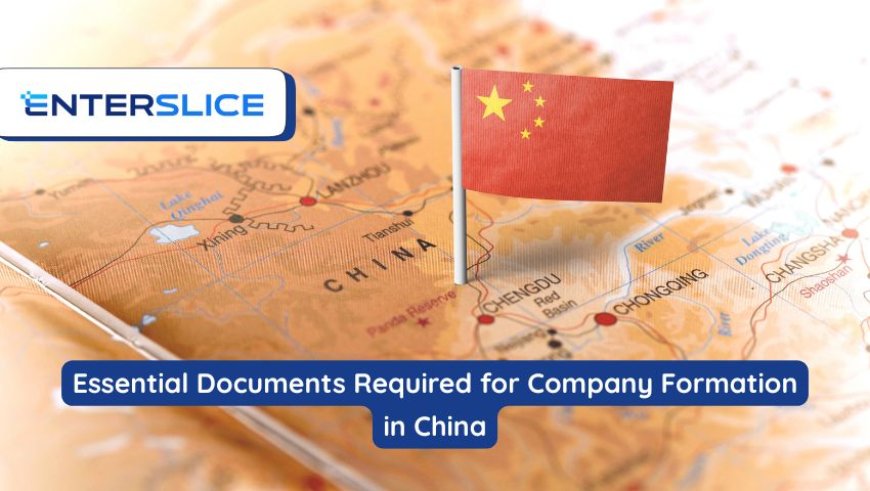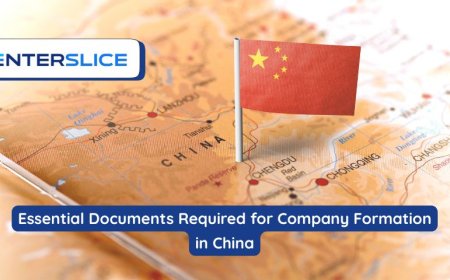Essential Documents Required for Company Formation in China: From AoA to Chop
Learn the key documents needed for company registration in China. Discover how to register a company in China as a foreign investor and meet legal requirements.

As China remains a powerhouse in global trade and manufacturing, more foreign entrepreneurs and enterprises are eyeing it as a prime destination for expansion. While the market potential is vast, the legal landscape is intricate. Registering a company in China as a foreign entity involves detailed documentation, strict regulatory compliance, and a good understanding of local administrative procedures.
Whether you're a startup founder or an international business executive, knowing the exact paperwork required for foreign company registration in China is crucial. This guide will walk you through the key documents—ranging from the Articles of Association (AoA) to the company seal (Chop)—that you'll need to prepare when opening your business in China.
1. Choosing the Right Business Entity
Before gathering documents, it's essential to decide which type of business entity you'll establish. Common options for foreign investors include:
-
Wholly Foreign-Owned Enterprise (WFOE) – Fully owned by foreign investors, ideal for manufacturing, services, or trading.
-
Joint Venture (JV) – A partnership between foreign and Chinese entities.
-
Representative Office (RO) – Not a legal entity, but allows foreign companies to conduct liaison activities in China.
Each entity type has its own documentation and regulatory requirements. This blog focuses primarily on the requirements for registering a WFOE, the most popular structure for foreign company registration in China.
2. Business Scope and Feasibility Study
Before you register a company in China, authorities require a clear business scope—a brief but legally binding description of your business activities. You must define this carefully, as operating outside this scope can lead to penalties or revocation of your business license.
Alongside this, a Feasibility Study Report is often required, especially for certain sectors. It outlines:
-
Business objectives
-
Target market
-
Operational plans
-
Financial forecasts
-
Staffing and resource requirements
Though not always legally mandatory, many local governments still request it, especially for approval at the provincial level.
3. Articles of Association (AoA)
The Articles of Association (AoA) is one of the core documents for company registration in China. It sets the foundation for how your business will operate and governs your internal management. The AoA must include:
-
Company name and legal address
-
Business scope
-
Registered capital and shareholder contributions
-
Governance structure (board of directors, legal representative)
-
Decision-making processes
This document must be drafted in Chinese and filed with the local Administration for Market Regulation (AMR).
4. Lease Agreement for Office Space
To register a company in China, you must have a physical business address. This means providing a formal, legally compliant lease agreement for commercial property.
Authorities will not accept residential addresses or virtual offices. The lease must cover at least 12 months and be registered with the local real estate bureau.
Some business parks and development zones offer registration-friendly addresses for foreign companies starting out in China.
5. Passport and Identification Documents
Each shareholder, director, and legal representative of the foreign company must submit:
-
A notarized and legalized copy of their passport (or business license, for company shareholders)
-
Personal information forms
-
Passport-sized photos for registration and banking purposes
If the parent company is the shareholder, additional documents such as a certificate of incorporation, board resolution, and authorization letter will also be needed.
These documents often need to be notarized in the investor’s home country, then authenticated by the Chinese embassy or consulate.
Also Read: Documents Required for Offshore Business Setup in the Ireland
6. Bank Reference Letter
Most local authorities still require a bank reference letter issued by a recognized bank in the investor's home country. This letter should verify that the company or individual has a good financial standing and has maintained an account with the bank for a certain period (usually 6–12 months).
This is mainly used to support the financial credibility of the foreign investor.
7. Company Name Pre-Approval
Naming your company in China isn’t as straightforward as elsewhere. You must apply for company name pre-approval with the local AMR. The Chinese name must follow a specific structure and cannot duplicate or resemble existing company names.
The approval certificate will be required for subsequent steps in the registration process.
8. Appointment Letters and Resolutions
You’ll need official appointment letters or board resolutions to designate key personnel:
-
Legal representative
-
Supervisor
-
General manager
-
Board members (if applicable)
Each of these roles has distinct legal responsibilities in China. The legal representative, in particular, holds significant power and liability, so appoint this individual carefully.
9. Registered Capital Declaration
China no longer requires a minimum registered capital for many sectors, but you must declare the amount of capital you plan to inject into the business. This information must be included in the AoA and other registration documents.
Registered capital is a commitment to fund the company over time, though the actual injection timeline can vary. Authorities often want proof of a solid financial base, especially in regulated industries.
10. Business License Application
Once all documents are prepared, you can apply for your business license through the AMR. This is the official proof of company registration in China and includes:
-
Unified social credit code
-
Business scope
-
Legal representative
-
Date of establishment
-
Registered address
Upon approval, your company becomes a legal entity.
Also Read: Benefits of Company Formation in Bahrain for Entrepreneurs
11. Company Chop (Seal)
In China, the company chop is more powerful than a signature. There are several types of official seals, including:
-
Company seal (official chop)
-
Finance chop
-
Legal representative chop
-
Invoice (fapiao) chop
These are legally binding and must be registered with the local Public Security Bureau (PSB). A company cannot operate or open a bank account without its official chop.
12. Tax Registration and Bank Account Opening
After receiving the business license, the company must:
-
Register with the tax bureau
-
Open a corporate bank account in China
-
Apply for electronic fapiao (invoice) systems
-
Register for social security and housing funds if hiring employees
These steps require the previously mentioned documents, particularly the chop and business license.
Frequently Asked Questions
1. How long does it take to register a company in China?
The process typically takes 6 to 8 weeks, depending on the region and completeness of your documents. Delays are common if notarization or approvals are not in order.
2. Can a foreigner fully own a company in China?
Yes. A Wholly Foreign-Owned Enterprise (WFOE) allows 100% foreign ownership, though some sectors are restricted or require joint ventures with local partners.
3. Is it mandatory to have a local Chinese partner to register a company in China?
No, not for a WFOE. However, joint ventures and representative offices may require partnerships or sponsorship from a local entity.
Establishing a business in China can be a rewarding venture, but it requires detailed preparation and compliance with local regulations. Understanding the key documents needed for company registration in China—such as the AoA, lease agreements, passport notarization, and the all-important company chop—will help you streamline the process and avoid legal pitfalls.




































































